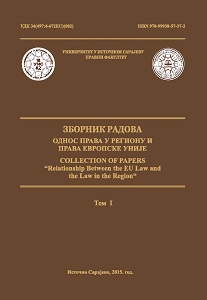Европски интеграциони пројекат у контексту европских заједница и Европске уније
The European Integration Project in the Context of the European Communities and the European Union
Author(s): Ivana Dragić
Subject(s): Law, Constitution, Jurisprudence, Governance, EU-Legislation
Published by: Правни факултет Универзитета у Источном Сарајеву
Keywords: European integration; ECSC; EEC; Euroatom; Federalism; Functionalism; Neofunctionalism; Intergovernmentalism;
Summary/Abstract: A proper consideration of evolution that extends from the European Community to the European Union is possible by applying contextual approach, specifically pointing out the political and economic environment that caused certain institutional arrangements and their legal contours.Therefore, in order to illustrate the past six decades of the European economic and political integration, it is useful to indicate conditions that influenced the dynamics of the project of voluntary structuring that will homogenize European countries.The twentieth century has compromised sovereign state as an exclusive modality of society coordination. Since the concept of sovereign states proved to be dysfunctional, due to its conservatism and particularism, the idea of mobilizing and synchronizing capacities within Europe emerged asan alternative. After 1945, the West European nation-states realized they had to deviate from the autistic power politics and transfer or more usually associate their sovereign powers in a collective enterprise. Peace was the the most explicit and evocative of ideals which were regarded as spiritus movens of the integrative process.The federalist approach undoubtedly determines European integration,and is considered as objective and strategy for its implementation at the same time. Yet, the major perspective from which the processes of European integration were studied was the normative and deterministic functional theory, until it was replaced by neofunctionalism, as the analytical and probabilistic theoretical paradigm. Finally, one of the contemporary models of European integration, intergovernmentalism, which has long been seenas the rival and alternative to neofunctionalism, presents a state-centric and rational approach to European integration. However, the very same prominent theories have failed to explain or predict the evolutionary pattern of the integrative efforts.
- Page Range: 167-189
- Page Count: 23
- Publication Year: 2015
- Language: Serbian
- Content File-PDF

